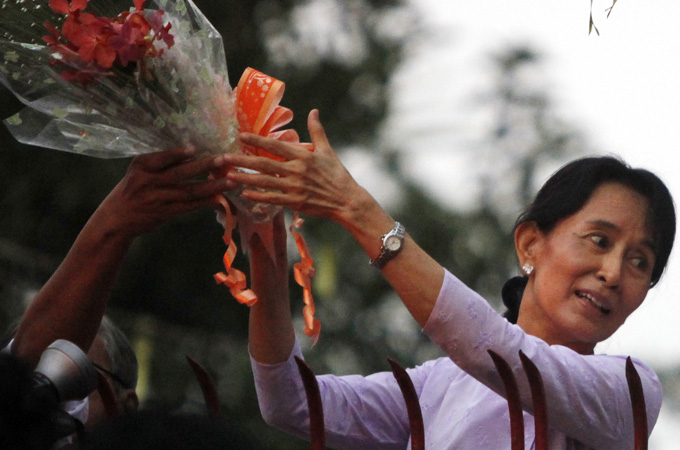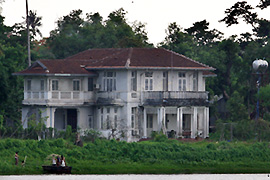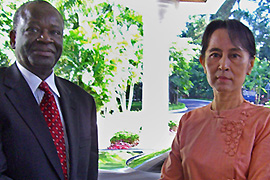Released after enduring house arrest for years, Aung San Suu Kyi has become an icon of peaceful resistance. |
 Aung San Suu Kyi is widely seen as the symbol of peaceful resistance in her struggle for democracy
Aung San Suu Kyi is widely seen as the symbol of peaceful resistance in her struggle for democracyAwarded the Nobel Peace Prize in 1991 for "her non-violent struggle for democracy and human rights", Aung San Suu Kyi has become an icon of Myanmar's struggle for democracy and of the global struggle against oppression.
Kept under house arrest or in jail for most of the past 21 years, she is the most prominent of more than 1,000 political prisoners held by Myanmar's military government.
Born in Rangoon, now Yangon, in June 1945, Aung San Suu Kyi is the daughter of Myanmar independence hero General Aung San.
He was assassinated by political rivals when she was just two years old, six months before Myanmar, then known as Burma, was granted independence from Britain.
As a young woman, Aung San Suu Kyi studied politics in New Delhi before moving to Oxford University in the UK in 1964 where she studied philosophy, politics and economics.
There she met and married British academic Michael Aris, with whom she had two sons, Alexander and Kim.
Rising discontent
In 1988 Aung San Suu Kyi returned to Myanmar to look after her mother, who had suffered a stroke.
Her return coincided with a period of rising discontent with the military government of Myanmar's ruler, General Ne Win.
When that boiled over into nationwide pro-democracy protests, she found herself unable to stay silent.
 |
| Aung San Suu Kyi is the daughter of Myanmar independence leader General Aung San |
She was named secretary-general of the National League for Democracy (NLD) and travelled the country calling for peaceful reform and democratic rule.
On September 18, 1988 the Myanmar military launched a bloody crackdown on protesters in which an estimated 2,000 people died.
Aung San Suu Kyi's mother died in December of that year but she stayed on in Myanmar, keeping up the campaign for an end to military rule.
In July 1989, in an effort to silence her, the military government placed her under house arrest in her lakeside villa on Yangon's University Avenue, accused of "endangering the state".
She was offered freedom on the condition that she left the country, but she refused.
Landslide victory
A year later, apparently confident that its crackdown had worked, the military government called a nationwide general election - Myanmar's first in 30 years.
The NLD scored a landslide victory, winning 392 of 485 parliamentary seats, although Aung San Suu Kyi herself was barred from standing.
Stung by the rejection, the military refused to recognise the result and announced it was extending Aung San Suu Kyi's detention.
| "It is not power that corrupts but fear. Fear of losing power corrupts those who wield it and fear of the scourge of power corrupts those who are subject to it." - Aung San Suu Kyi |
Pictures of the woman many refer to simply as The Lady are kept and maintained with almost spiritual reverence, even though owning such items has in the past attracted serious repercussions from the authorities.
In 1991 Aung San Suu Kyi was awarded the Nobel Peace Prize in recognition of her achievements as "the symbol of the revolt against violence and the struggle for a free society".
"The little woman under house arrest stands for a positive hope," said Francis Sejersted, chairman of the Nobel committee, at the prize ceremony.
"Knowing she is there gives us confidence and faith in the power of good."
Movements restricted
In 1995 following intense international pressure, the military government announced it was freeing Aung San Suu Kyi from house arrest, although in practice her movements remained highly restricted.
Four years later her husband, Michael Aris, whom she had not seen for several years, died of cancer in the UK.
 |
| She has spent most of the past 20 years under house arrest in her Yangon home |
In 2000, after breaking travel restrictions by travelling to the northern city of Mandalay for a meeting with NLD officials, she was again put under house arrest.
She was freed two years later, but in May 2003 was sent to Yangon's notorious Insein prison following a bloody clash between NLD supporters and a pro-government mob.
After several months in the jail she was returned to house arrest in her crumbling lakeside villa, where she was held virtually incommunicado for years.
Visitors to the house were tightly restricted, while mail and telephone communications were monitored and intercepted.
Frail figure
The few people who had made contact with her during her house arrest said the growing frustration at the lack of progress with the government had taken a heavy toll on her health.
Photographs of meetings with the United Nations' special envoy, Ibrahim Gambari, showed a thin and frail figure, spurring renewed international calls for her release.
 |
| Photos in early 2009 raised concerns over Aung San Suu Kyi's poor health |
In one of her most famous speeches delivered before the 1990 elections, she called for a country free from fear.
"It is not power that corrupts but fear," she said.
"Fear of losing power corrupts those who wield it and fear of the scourge of power corrupts those who are subject to it."
In 2009, Aung San Suu Kyi was convicted of violating the condition of her detention by allowing John Yettaw, a US national, to stay at her home after he swam across a lake to get there.
She has since offered to lobby the international community to lift wide-ranging sanctions on Myanmar, many of which were imposed more than two decades ago.
In the 2010 general elections, held for the first time in 20 years, Aung San Suu Kyi was barred from contesting and her NLD party boycotted the vote.
Aung San Suu Kyi was released on 13 November 2010, and, after boycotting elections that year, she stood as a candidate in the April 1, 2011, by-election for the constituency of Kawhmu, south of Yangon.
She said that she did not regret standing for parliament, as it boosted people's interest in politics after decades of military rule.
No comments:
Post a Comment